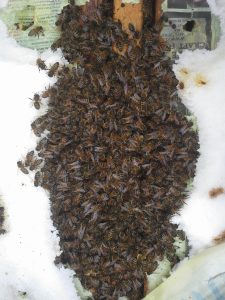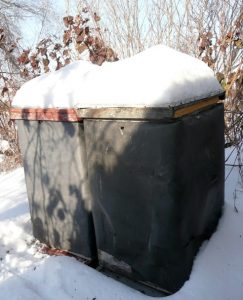“Black Gold” by Todd Hardie, founder and beekeeper, Caledonia Spirits
Tim has just delivered 5 yards of rich, black compost from the adjoining Jasper Hill Farm, Greensboro, Vermont, jasperhillfarm.com. Time has cured this manure into a pure gold for our garden, and the process is moving to capture the gas off of this manure for heating on the farm. Three colonies of honey bees are sitting to the left of the barn.
I helped guide his truck to avoid the garlic and carrots that are overwintering under a layer of hay. A goal on both farms is to restore fertility to the land. We see that the soil is worn out when the honey crops are consistently low in this area. It has been a challenge to farm here in the Northeast Kingdom, and the farmers have struggled to give back to the land. It is not their fault; farming is a challenging and tough business. This is why the work in our area with the Cellars at Jasper Hill, Pete’s Greens, High Mowing Seeds, and Caledonia Spirits is so exciting. Value added agriculture offers a way to give back to the land, and healthy soils support strong families.
I recall one day when our daughters and I passed a dairy farm in Vermont. They remarked how good the smell was from the fresh manure that had been spread in the field. I was proud of them for realizing how valuable a resource this was and not being offended by the aroma. Then I realized that I was successful at being a father. O, there are other things that may determine this, but here in Northern Vermont, we realize the importance of the land and never stop nuturing her.
thank you for our your interest in and support of our work at Caledonia Spirits. Todd
 Starting around March 20 each season, we make the rounds in the scattered patches of snow and check on how our honey bees came through the winter. I look forward to being out on the land, and though the days can be cold and raw, there is a great warmth in the returning of the light and promise of Spring in the air. We delight in seeing the bees that are alive, these hives having made it through our long Northern winter. This is entwined with the sadness of finding that some of the bee hives did not make it and are dead. Often, the bees that have passed on have a box of honey left, that they do not need, and this is moved to the bee hives that are alive, and often light in weight and in need of honey. The hives with insufficient stores would not make it to the days of Spring when the flowers will provide them with enough nectar and pollen to sustain their lives. In transferring the honey from one hive to the next, I feel a renewed relationship with the bees and the help that we give them.
Starting around March 20 each season, we make the rounds in the scattered patches of snow and check on how our honey bees came through the winter. I look forward to being out on the land, and though the days can be cold and raw, there is a great warmth in the returning of the light and promise of Spring in the air. We delight in seeing the bees that are alive, these hives having made it through our long Northern winter. This is entwined with the sadness of finding that some of the bee hives did not make it and are dead. Often, the bees that have passed on have a box of honey left, that they do not need, and this is moved to the bee hives that are alive, and often light in weight and in need of honey. The hives with insufficient stores would not make it to the days of Spring when the flowers will provide them with enough nectar and pollen to sustain their lives. In transferring the honey from one hive to the next, I feel a renewed relationship with the bees and the help that we give them.